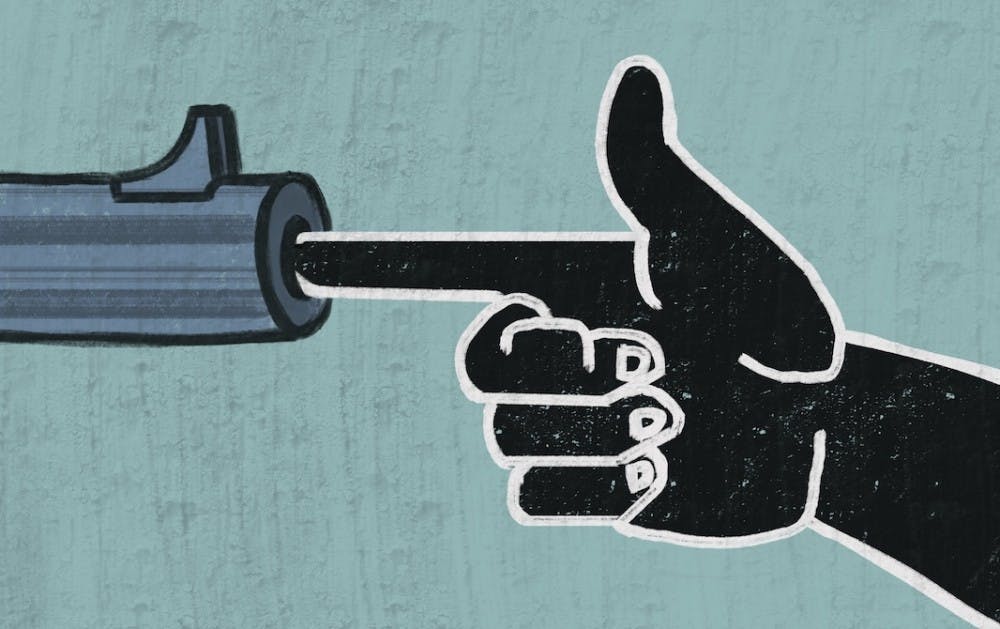ASU Mary Lou Fulton Teachers College students and faculty are grappling with what continual school violence means for their safety in the classroom in wake of Parkland shooting.
Some education students said if the trend of school shootings continues, teachers will also have to focus on public safety — with the thought of "what if?" in the back of their minds.
Carole G. Basile, Mary Lou Fulton Teachers College dean, said teachers are always concerned about the safety and education of their students. At the teachers college, Basile said there isn't a course dedicated to educating students on mass shooting preparedness, but said they do learn about those things through student teaching.
"We are trying to be positive," Basile said. "We teach about how do you build a classroom culture. The real safety and emergency procedures come when they (students) are out in schools, so that is built into our curriculum in that way but it's more of an experiential perspective."
She said there have always been measures in place to protect children from any situation like mass shootings or natural disasters, but the issue is at center stage because of recent school shootings.
"I think people are thinking about it more, but we've always paid attention to it," Basile said. "The safety and security of kids is our number one priority."
In 2018 there have been 18 school shootings across the United States, according to a tweet from Everytown For Gun Safety.
However, it is important to note that this statistic is controversial because organizations define "school shooting" differently. Everytown defines a "school shooting" as "any time a firearm discharges a live round inside or into a school building or on or onto a school campus or grounds, as documented by the press and, when necessary, confirmed through further inquiries with law enforcement or school officials."
Basile said school shootings are unpredictable as they can happen at any school at anytime and teachers should notice if a student is displaying alarming behavior.
Despite the dangers associated with teaching, aspiring educators still intend to become teachers or be involved in education policy.
Hannah Scully, a sophomore studying elementary education and the vice president of the Mary Lou Fulton Teachers' Council, said there has been talk of adding a mass shooting course to the curriculum in the future, but currently there's not.
She said it may be important to have teachers be educated on mass shootings but it might not be a fool-proof solution.
"It's tricky. Anything that can help teachers is definitely beneficial but I hesitate to point to that as the solution to problems like mass shooting," Scully said. "I think that there are steps to be taken first."
Breonn Peoples, an educational studies senior, said there are many elements that are involved in school gun violence and though a course would beneficial, preparedness isn't easily taught.
"It's really scary because from a teacher's perspective, there's like the thought of 'what do we do'," Peoples said. "There's nothing that (ASU) can teach us...we can't have a class about what do to. There's not a procedure."
Anna Baize, an elementary education senior who currently is student teaching, said it's unfortunate teachers need to be trained on mass shooting preparedness.
"We need to be trained on it as teachers once we are at a certain school," Baize said. "We all know that it's our responsibility to keep students safe but why should teachers be the only solution to that."
Despite the dangers that surround classrooms, Mary Lou Fulton students still have their hearts set on becoming educators. Baize said many of her classmates have said that everyone has a different reason for becoming a teacher, but at the core the reasons are the same — they come down to a passion for changing kids lives through teaching.
Baize said she's been discouraged from teaching her whole life by people who warn her about the low pay and the danger of violence.
"But I feel a passion for changing kids' lives," Baize said. "We teach them content but also create a warm and accepting environment that can change their outlook on life, so that maybe there aren't people that want to go hurt other people in the future."
Reach the reporter at cmgiulia@asu.edu or follow @tinamaria_4 on Twitter.
Like The State Press on Facebook and follow @statepress on Twitter.




